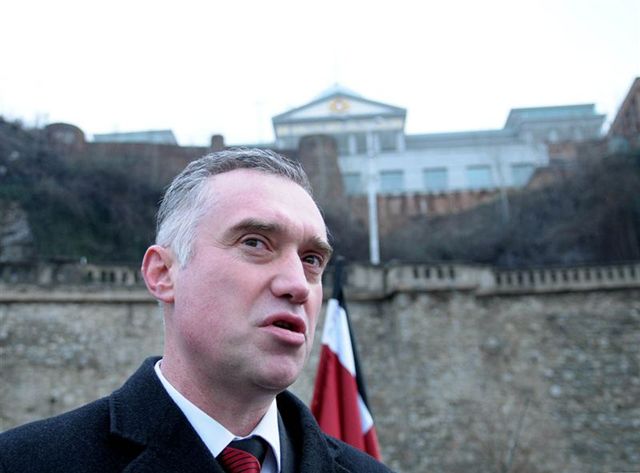
Tbilisi’s Municipal Election: a Game on the Radical Opposition’s Turf
Publication: Eurasia Daily Monitor Volume: 7 Issue: 96
By:

Georgia is holding local elections country-wide on May 30. The municipal election in Tbilisi is the main event in these elections. Many in the opposition and in Moscow regard the Tbilisi election as a possible trigger of upheaval for regime-change in Georgia.
Most opposition groups, whether moderate or radical, are weak in the countryside, but have their strongholds in Tbilisi. Extra-parliamentary radical groups rely on their social networks in certain Tbilisi neighborhoods. Eight rival lists, endorsed by twice as many parties and groups, are challenging the incumbent Mayor, Gigi Ugulava, and the governing National Movement’s list for the municipal council. Ugulava, a member of the presidential team, is running on his non-political record as city manager.
Control of the capital city’s mayoralty is regarded as a major prize to be gained before the next presidential election. That election is constitutionally due in 2013; but the radical opposition has called for removing President, Mikheil Saakashvili, and the government every year since 2007, threatens with a repeat performance this year, and seeks to precipitate national elections well before 2013 (EDM, May 11).
Opposition groups are too small and splintered to win the Tbilisi election in the first round, if at all. However, the radical opposition aims to prevent the incumbent mayor’s re-election in the first round. Under the electoral law, a mayoral candidate needs 30 percent of the votes cast in the first round to win the election outright. A run-off is held if two candidates garner at least 30 percent each in the first round.
A second round, if held, might turn into a tight race. Radical groups have already announced their intention to allege fraud and rise up to topple the authorities, if the opposition candidate loses in the second round. The Organization for Security and Cooperation in Europe (OSCE) is sending some 350 observers to Georgia’s local elections (Civil Georgia, May 6).
However, the OSCE can no longer expect its election assessments to be necessarily respected by the losing sides in elections. In January 2008 in Georgia and April 2010 in Moldova, the defeated oppositions rejected the OSCE’s validation of those elections’ outcomes.
The main opposition candidates for Tbilisi mayor are Zviad Dzidziguri, representing the National Council bloc of three factions, and Irakli Alasania representing the Alliance for Georgia. Both groupings operate in the extra-parliamentary arena. Candidates representing the parliamentary opposition include Gia Chanturia, the former head of the Georgia International Oil Corporation, for the Christian-Democrat Party, and brewery owner Giorgi Topadze for the Industrialists’ party.
The National Council, led by the former Prime Minister, Zurab Noghaideli, campaigns with slogans for re-orienting Georgia toward Russia (Zurab Noghaideli’s National Council Bandwagons With Russia, EDM May 18). This would have been inconceivable in Georgia before the 2008 war and Russian ascendancy in the region. Dzidziguri appears to be the antithesis of a candidate for municipal mayor, given his agitated temper and troubled record from the civil strife of the 1990’s. His candidacy indicates that the National Council does not aim to win the election, but rather to identify and mobilize supporters on a militant fringe.
The Alliance for Georgia supports its leader, Irakli Alasania, for mayor. This Western-oriented group is studded with former diplomats, including Alasania himself and Salome Zourabichvili who leads an allied party. Their teams lack a solid organizational base, and their personal styles are hardly attuned to the mass of Tbilisi voters.
Alasania served with distinction in multiple governmental and diplomatic posts, before resigning in the fall of 2008. He criticized the president and government for not persevering in the dialogue with the Abkhaz authorities, which Alasania himself had handled for a time without results. Last year, Alasania attempted to position himself uneasily between the law-abiding opposition and the radicals demanding regime change. This year his group has stayed away from the radical opposition’s actions.
Zourabichvili, Georgian Foreign Minister in 2005-2007 following her repatriation from France, differs with her ally Alasania and agrees with the radicals on precipitating regime change. However, she equally opposes the National Council’s Russian orientation as a “political crime” and deems any cooperation with it as unacceptable (Rezonansi, May 10).
Many of the radical figures involved in the 2007-2009 regime-change campaigns and 2008 elections are not participating in the Tbilisi municipal elections. However, their political bases are rooted in the city; and their followers can be expected to join post-election protests on behalf of candidates who would cry fraud, regardless of whether that is the case or not.




